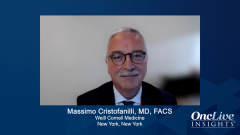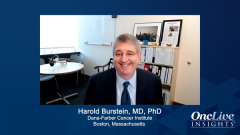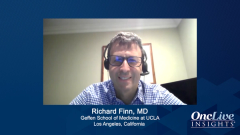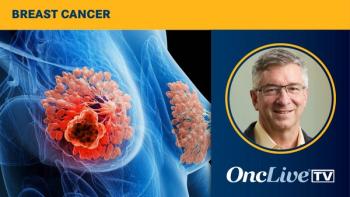
Addressing Unmet Needs in HR+/HER2- Metastatic Breast Cancer
Before closing out their discussion on CDK4/6 inhibition in HR+/HER2- metastatic breast cancer, experts highlight remaining unmet needs in this setting.
Episodes in this series

Transcript:
Richard Finn, MD: Fortunately, we’ve seen a big leap forward in ER [estrogen receptor]–positive HER2 [human epidermal growth factor receptor]–negative breast cancer. When we look at the survival in the frontline studies coming out now, whether it is the control arms or even the treatment arms, we see that women are living well over 4 years—in some cases, over 5 years—with ER+ HER2- breast cancer. This is a big move forward. However, the disease hasn’t been cured. We’re helping people live longer with a chronic illness and with drugs that tend to be better tolerated.
One big unmet need is for the women who progress rapidly on these drugs. A subset of patients get started on these drugs and progress very rapidly, and that group will have a poorer prognosis than those who get along with disease-free control. This group of patients represents an unmet need, and it’s important to understand what’s driving that. What other new drugs might play an important role in managing these patients other than chemotherapy?
We’ve seen benefits with abemaciclib in the adjuvant setting, as this gets incorporated for these high-risk patients. When these patients recur on a CDK4/6 inhibitor, like abemaciclib, what do we do for those patients? Are we back to the paradigm where we’re using endocrine treatment? We still have everolimus, which can be used in that population. But what’s the next big breakthrough for ER+ HER2- disease? I can’t say. The ball has been moved significantly up the field in terms of overall survival with these drugs, but there’s still room for improvement. I look forward to all the data in the coming years.
Harold Burstein, MD, PhD: Scientifically, this mechanism of resistance, endocrine therapy, remains an open and fascinating question that we all wish we understood more about. In time, some of these oral SERDs [selective estrogen receptor degraders] will get to market, and they certainly have activity. If you can imagine the global impact of having an orally available SERD instead of an injectable SERD, it would be great from the patient’s point of view to have such tools available.
Massimo Cristofanilli, MD, FACS: Hormone receptor–positive metastatic breast cancer is a group of diseases that is very heterogeneous. We understand that from a number of evaluations through NGS [next-generation sequencing] and molecular tests in general. It’s important to consider that at some point, we may want to go back to the tissue and subtypes of this disease to better direct targeted therapy. For a simple cell-free DNA and NGS, I’ve already shown a number of mutation alterations that seem to be important for patients with metastatic disease for targeted therapy: HER2 mutations—for example, in a subset of patients, particularly metastatic lobular cancer—the PI3K mutations; AKT mutations; and ESR1 mutations, which is 1 of the most exciting ideas of drug development.
We’re witnessing a clinical trial looking at ESR1 targeting with new SERDs, which will be more effective compared with Faslodex, or fulvestrant. This is important because it gives us the opportunity to look at metastatic ER+ disease as a disease in which the approach to switching therapy would include changing not only the backbone of CDK4/6, as we’re doing now, but also the androgen agent. A number of agents have shown significant promises. The most intriguing part is the possibility of detecting in the bladder ESR-driver mutations early on, as shown from the PADA-1 study. We can modify the study and impact the overall survival of this patient simply by delaying the developing clinical progression and acting at the time of the molecular progression. This area is developing very quickly with the availability of our diagnostic capabilities with cell-free DNA. The new SERDs developing are able to target the ESR-mutant. Hopefully we’ll have a new agent FDA approved, which will expand the possibility of treatment for these patients.
Transcript edited for clarity.







































